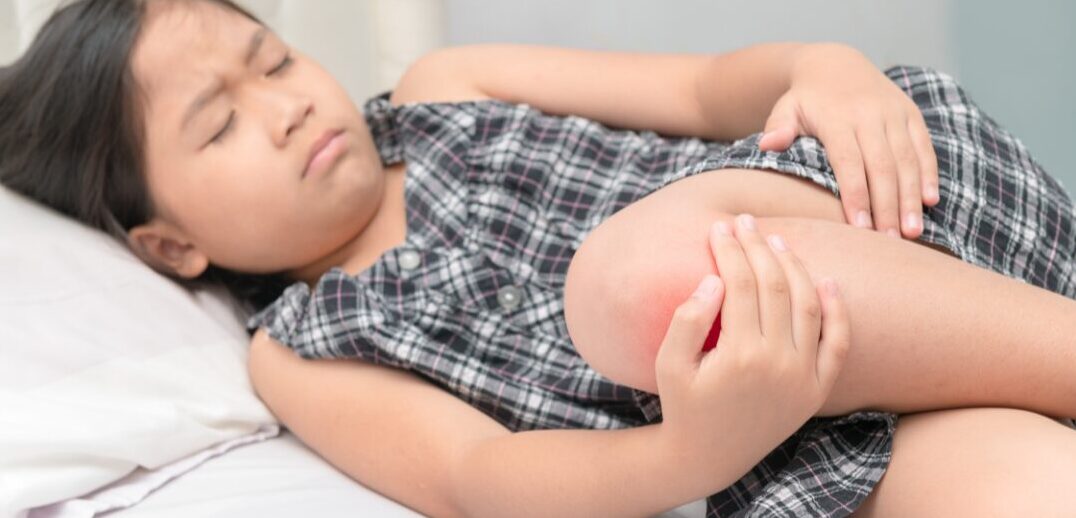
helping kids just be kids
Pain in children with rheumatic disease is common and can be frustrating, stressful, and worrisome for both the child and the whole family. Pain can even persist when the inflammation caused by the disease is well controlled. In addition to the resources below, remember that both you and your child’s mental health plays and important role in pain management. Explore our dedicated mental health toolkits by clicking the following links: Mental Health for Youth and Mental Health for Caregivers.
Pain Management can feel like an overwhelming feat, but there are lots of proven strategies and the full support of the Cassie + Friends community to help your child get back to just being a kid again!
intro to pain + pain management
In this recording (from our March 2022 Pain Webinar), you’ll hear from JIA patient, Devyn Nichols (age 14) and her mom, Jennifer Heeley, who share their experience with chronic pain since being diagnosed two years ago in March 2020. You’ll also hear from expert Dr. Tara McGrath, Pediatric Rheumatologist & Pain Medicine Physician, as she discusses strategies to help kids and families cope with day-to-day pain so they can get back to doing the things they love!
More specifically, you learn about:
- Pediatric chronic pain in the context of childhood rheumatic diseases
- The biopsychosocial model of chronic pain
- Evidence-based management strategies for children with chronic pain.
for parents/caregivers
Being the parent or caregiver of a child in pain can be extremely challenging but, remember that you are not alone!
As you care for your child, it’s important to recognize how their treatment plan might be affecting you and to be aware of the support available to help you. Consider trying the self-check below to reflect on how you are coping. To learn more about how your child’s JIA treatments and treatment-related pain could be affecting you, CLICK HERE.
Parent/Caregiver Self-Check: How are You Coping?
- Reflect on your own feelings about your child’s treatments as well as your child’s reactions to those treatments. How do you feel? Can you relate to any of the themes above?
- If you feel you could use extra support, be sure to ask your Pediatric Rheumatology team about the pain management programs and/ or mental health supports accessible at your centre.
- You can also check out this resource from our partners at Solutions For Kids in Pain and great sites like The Meg Foundation to learn more about various strategies such as humor, deep breathing, distraction, and talking about things other than pain – strategies that tend to be associated with better pain reports.
- Consider joining Cassie + Friends’ Online Support Network – a great place to meet and talk with other parents of affected children in a safe and supportive environment.
- If you are a healthcare provider, please check in with parents about how they are managing with their child’s treatments – and if they need any support
video resources
Below you will find resources created by AboutKidsHealth in partnership with Cassie + Friends to help youth manage their pain.
Coping with Pain Tips from C+F Youth
Understanding Pain in Less than 5 Minutes
Tame the Beast – It’s time to Re-Think Chronic Pain
Dealing with Flares
This video explains how to recognize what is and what is not in your control and how to accept what you cannot change when living with a chronic physical or mental illness.
Dilute the Yuck!
This audio meditation helps you identify pleasant or neutral experiences in the midst of discomfort. Engaging in this practice can be helpful when feeling overwhelmed.
Visualize Your Pain
This audio meditation helps you visualize your discomfort. When you are struggling with pain, it can be used to help discover a new way to experience and respond to it.
Ice Cube
This meditation helps you find a new way to experience discomfort. Use it to explore the thoughts, feelings or sensations that come with being upset or feeling soreness.
Soften, Soothe, Allow
This audio meditation helps you soften towards discomfort instead of resisting uncomfortable experiences or distracting yourself when they arise.
Comfort Your Pain
This audio meditation helps you explore and bring comfort to an unwanted thought or an area of physical or emotional discomfort. Use it when you are feeling overwhelmed.
f.a.q.’s
We would suggest to speak with your rheumatology team or with your family doctor.
Rheumatology clinics often have access to psychologists or other resources that can help to
develop strategies to cope with disease and impact. Family doctors might know good
community resources that might be helpful for your daughter.
We would suggest speaking with your pediatric rheumatology care team about your concerns
with your child’s participation at school. Rheumatology clinics generally have a letter to share
with the school for modifications that may be required by a child with arthritis. If this is not
sufficient, often the team’s social work, occupational or physiotherapy can liaise with the
school (on behalf of you child with consent) to bridge any knowledge gaps the school has about
modifications that a child with arthritis may require. Our goal is to have our child participate to
the best of their ability and there are several modifications that may be helpful, so please speak
with your care team.
Pain is truly both a physical and an emotional experience perceived and processed by the brain,
and it is a real health problem. Each child has a different pain perception, and the meaning of
pain is also different from child to child. Age differences in pain perception are not consistent.
Acute and chronic pain is an area where there is a LOT of research going on in Canada and
worldwide. Researchers are studying the effects of early childhood pain on adolescents and
adults, how best to measure and treat pain in children of all ages.







